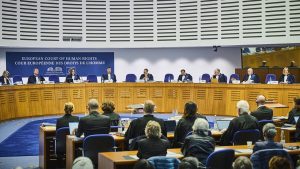By: Karla Lellis
Visiting Impunity Watch News Writer
STRASBOURG, France – On March 12, 2024, the European Court of Human Rights (ECHR) ruled in the case of Jasuitis And Šimaitis V. Lithuania, finding that coercing women to work as “web models” constituted as human trafficking. This decision highlights the importance of legal clarity and a victim-centred approach to dealing with such exploitation, aligning with Article 7(1) of the Convention.
 |
The proliferation of internet technologies has profoundly transformed the dynamics of human trafficking. The UNODC’s 2020 Global Human Trafficking Report characterizes cyberspace as “digital hunting grounds” for traffickers, who exploit the expansive reach and anonymity of online platforms. Traffickers have skillfully leveraged digital tools to advertise deceptive job offers, promote exploitative services, and identify vulnerable individuals through social media. The rise of webcams and live streaming has further facilitated new forms of exploitation, as traffickers demonstrate a disturbing aptitude for using digital spaces to perpetuate their illicit activities.
This disturbing trend is exemplified in the Jasuitis and Šimaitis v. Lithuania case, where young women were recruited through deceptive online advertisements to work as “web models.” The victims were coerced into performing sexual acts on camera, including nudity and using sex toys, facing threats and psychological manipulation. Police investigation revealed multiple cases of exploitation, with the perpetrators providing equipment and apartments, then demanding debt repayment while closely monitoring and pressuring the women to generate income through long, exploitative work hours. Vulnerable young women facing financial, or family difficulties were specifically targeted and subjected to these abusive practices, leading to legal action against the traffickers.
In their defense, the Jasuitis and Šimaitis applicants argued that their convictions for trafficking were unpredictable, thus violating Article 7 of the European Convention on Human Rights. Article 7 reflects the principle of nulla poena sine lege (no punishment without law), which prohibits criminal sanctions for acts not clearly defined as offenses. The applicants claimed the national courts’ interpretation of trafficking laws was overly broad and lacked clarity, leading to uncertainty about the scope of liability. They argued this lack of foreseeability undermined their right to a fair trial and legal certainty under Article 7.
However, the European Court of Human Rights unanimously rejected this argument. The Court found the relevant criminal law provision, Article 147 § 1 of the Lithuanian Criminal Code, did not give rise to ambiguity, and the domestic courts’ interpretation was consistent and sufficiently precise. Crucially, the Court determined the applicants could foresee that their actions of deceiving victims and exploiting them for pornographic services would constitute a trafficking offense. The Court did not find the application of the law to be overly expansive or lacking in safeguards against arbitrary prosecution.
This ruling reinforces the ability of European states to effectively prosecute human trafficking, even as traffickers adapt their methods to the digital realm. As technology continues to transform the landscape of exploitation, robust legal frameworks and victim-centered approaches will be essential in combating this evolving menace.
For further information, please see:
ECHR – Jasuitis and Šimaitis V. Lithuania, App No. 28186/19 and 29092/19 – 12 Mar. 2024
UNDOC, Global Report on Trafficking in Perso, U.N. Doc. Sales No. E.20.IV.3 – 2020



